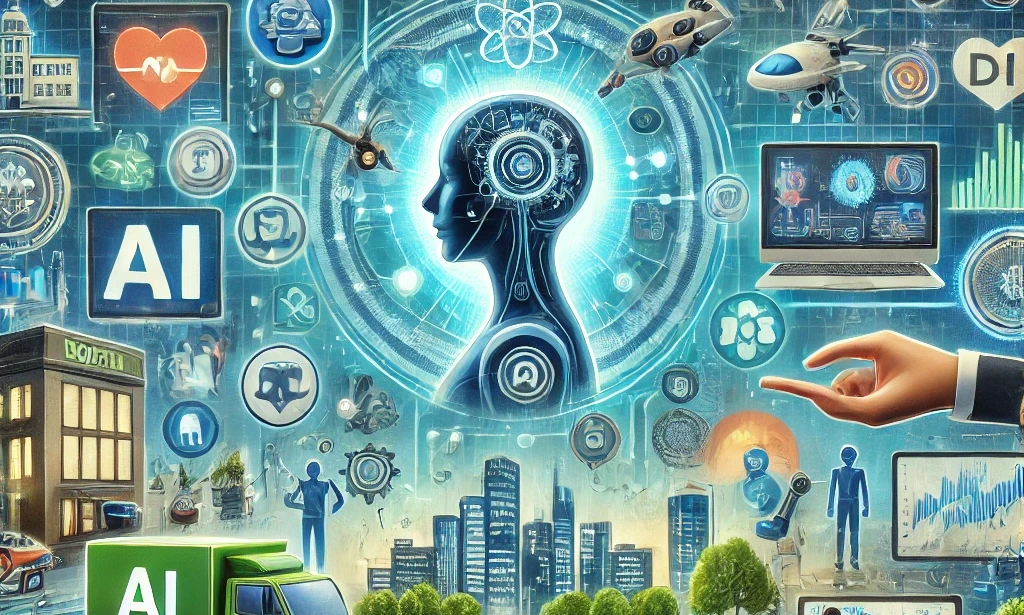In the last decade, artificial intelligence (AI) has gone from a futuristic idea to a driving force in many areas of our daily lives. From personalized recommendations on streaming services to voice assistants like Siri and Alexa, AI is transforming the way we work, communicate, and even entertain ourselves. But what exactly is AI doing in our day-to-day lives, and what might the future hold as the technology advances further?
Here’s an exploration of AI’s impact on society and what we might expect in the years to come.
1. AI in Communication and Entertainment AI has become an integral part of social media, streaming, and digital communication. Every time we scroll through Facebook, Instagram, or Twitter, AI algorithms are at work to personalize our feeds, showing us content that aligns with our interests. Similarly, streaming platforms like Netflix and Spotify use recommendation algorithms to suggest content based on our preferences and watching/listening history.
These algorithms analyze vast amounts of data to predict what we might enjoy, creating a highly personalized entertainment experience. As technology advances, AI is expected to deliver even more immersive experiences with augmented reality (AR) and virtual reality (VR), creating more interactive and engaging forms of content.
2. AI in Healthcare One of the most impactful applications of AI is in healthcare. From diagnostic tools to predictive analytics, AI is transforming patient care. Machine learning models can analyze medical data, helping doctors detect diseases like cancer at earlier stages and offering personalized treatment recommendations. Telemedicine platforms with AI-driven virtual assistants are helping patients manage symptoms, book appointments, and receive initial consultations without needing to visit a clinic physically.
The development of predictive analytics in AI has enabled medical professionals to foresee potential health crises before they occur, potentially saving lives and reducing costs. In the near future, we might see AI assisting in complex surgeries, further expanding its role in improving patient outcomes.
3. AI in Transportation Self-driving cars have been a topic of discussion for years, and they’re closer to reality than ever. Companies like Tesla, Waymo, and others are working tirelessly to bring autonomous vehicles to the masses, leveraging AI to create safer and more efficient modes of transportation. AI can analyze traffic patterns, detect obstacles, and make real-time decisions to ensure passenger safety.
AI is also being used in air travel, where predictive models help airlines optimize fuel consumption, route planning, and maintenance schedules. In logistics, AI-powered drones are already being tested for last-mile delivery, promising a revolution in how goods are transported to consumers.
4. AI in Work and Productivity In the workplace, AI is automating repetitive tasks, allowing employees to focus on higher-value work. From scheduling meetings to analyzing large datasets, AI-powered tools like Microsoft’s Office 365 and Google Workspace are helping businesses increase productivity. Tools like ChatGPT are also enabling employees to generate content, brainstorm ideas, and automate customer service interactions.
AI in Human Resources (HR) is helping recruiters identify the best candidates by analyzing resumes and ranking applicants based on their compatibility with job requirements. For companies, this not only speeds up the hiring process but also helps in creating a more diverse and skilled workforce.
5. AI in Education The education sector is seeing the benefits of AI, particularly in personalized learning. Adaptive learning platforms use AI to assess a student's knowledge level and provide tailored content, helping learners progress at their own pace. For example, platforms like Khan Academy and Duolingo use AI to guide students through lessons, ensuring that they grasp foundational concepts before moving on to more advanced topics.
AI-powered tutors and chatbots are also available to answer students’ questions, offer feedback on assignments, and even grade exams, helping teachers focus on more personalized teaching.
Challenges and Concerns with AI Despite these advancements, the widespread use of AI brings challenges. Concerns about data privacy are growing, as AI algorithms rely heavily on large datasets that often include personal information. Ethical issues around AI decision-making, such as potential biases in algorithms, can also have serious implications, especially in areas like hiring, healthcare, and law enforcement.
Moreover, AI-driven automation is expected to impact jobs, particularly in fields like retail, manufacturing, and transportation. While AI creates new opportunities, reskilling will be essential to help workers transition to roles that require human creativity, empathy, and complex decision-making.
The Future of AI in Society Looking ahead, AI’s role in society is only expected to expand. Innovations in areas like quantum computing could make AI even more powerful, opening up new possibilities across sectors. Researchers are working on "general AI," a form of AI that could perform any intellectual task that a human can do, which could completely redefine human-computer interaction.
However, with great power comes great responsibility. Governments, corporations, and researchers must work together to create ethical guidelines and regulations to ensure that AI benefits society without compromising our values.

You must be logged in to post a comment.